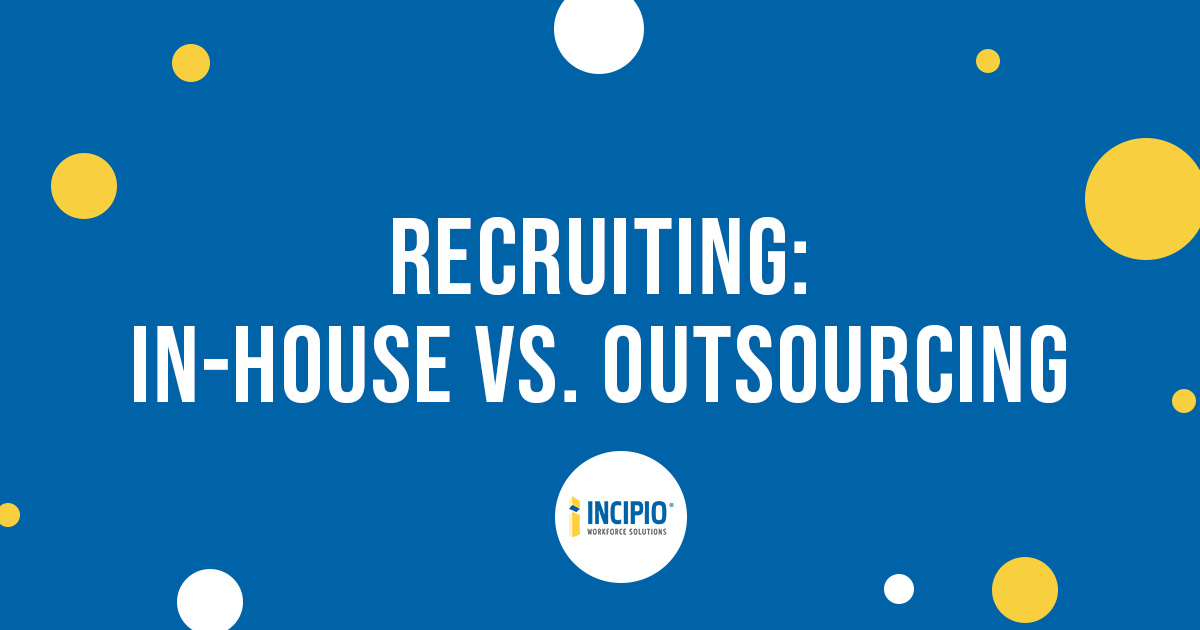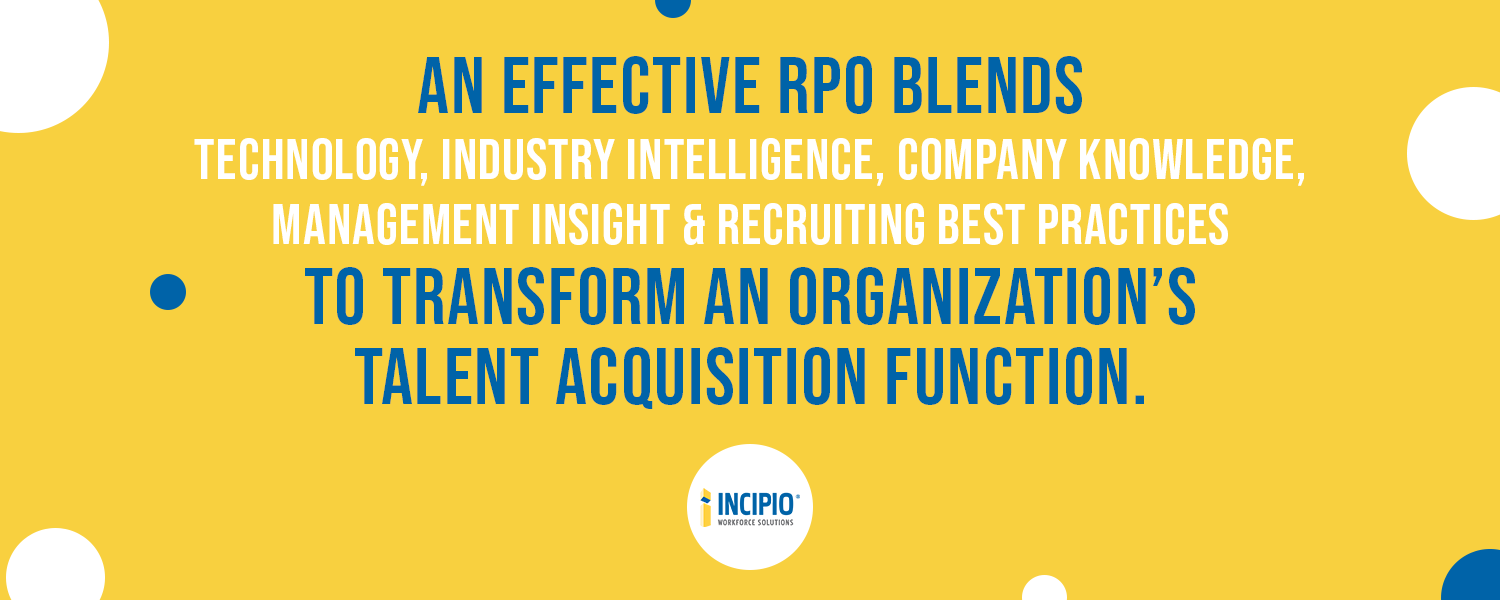Recruiting: In-House Vs. Outsourcing
![]() incipioworkstg
on
October 4, 2021
incipioworkstg
on
October 4, 2021

RECRUITING: IN-house vs. outsourcing
Hiring and retaining talent is an essential step in building a successful business operation. But let’s face it, recruiting can be difficult, time-consuming, and inefficient. A thriving workforce is crucial to any company reaching its full potential, and the best businesses tend to have the best teams. There are a few strategies organizations can utilize when building and growing their team. Companies can use in-house human resources & recruiting teams, outsource their recruiting efforts, or do a hybrid of the two. Determining which strategy is best requires a closer look at the organization as a whole. Examining areas like company size, expansion plans, cost of recruiting, retention, and employee engagement are places to start.
The talent acquisition and employee retention game has changed dramatically over the last few years. More and more companies are weighing whether to outsource their recruiting tasks, otherwise known as Recruitment Process Outsourcing (RPO) or keep them in-house. RPO is a strategic plan put in place to work with an outside company like Incipio to manage (in whole or part) a company’s recruiting tasks. There isn’t a one-size-fits-all where recruiting is concerned, and companies need to evaluate their business to assess their organization’s best course of action.

Most companies are not in the recruiting and talent acquisition business, and recruiting or growing a team can take a company’s focus away from its core business. Outsourcing recruiting permits company leaders to focus on other aspects of the business while trusting experts to improve recruiting effectiveness, reduce turnover, cut costs, and allow growth. Outsourcing recruiting also allows current human resources teams to focus on current employees, retention, employee performance, and the employee experience, which is critical in today’s market.
When an organization works with a company like Incipio, it can focus on specific hiring needs. A company can also decide which part of the recruiting process they want to be involved with. For instance, hiring managers and upper-level management can enter the process after the initial screening has taken place and the candidate is deemed a good fit. Removing hiring managers from the initial screening tasks that are sometimes tedious and time-consuming gives them more time to focus on their core business tasks.
Different roles or positions a company is hiring for can require different skills or experience on the recruiter’s part, and not all recruiting teams are created equal. When working with an outsourced company, you have access to various experience levels and knowledge that can span industries, positions, technology, and more. Incipio’s CEO, Molley Ricketts, communicates what an RPO can bring to the table when filling multiple positions requiring different skill sets. “Let’s say you have a Vice President of Operations position that you have come available. Well the recruiter that you need for that role, is probably not the same recruiter you have doing your day-to-day work. So you are going to want a recruiter that has more experience in that higher level of work, in recruiting that talent, then the individual that is recruiting for more entry-level or mid-level management roles.” Molley goes on to say, “Outsourcing your recruiting allows you to have a diversified team, without necessarily having to pay for a diversified team.”
Most companies don’t understand what they spend on recruiting, and there is often a misconception about the savings that outsourcing can bring to an organization. In-house recruiting can be costly, and many outsourcing companies have to work with clients to educate them on the actual costs associated with hiring. In addition to the labor costs of recruiting, there are other costs like software, pre-employment testing, and job posting that must be considered. For small businesses, this can especially be burdensome, but according to Ricketts, “being able to outsource it for the needs specifically that you have, is wildly cost-effective. As opposed to bringing someone in-house.” The RPO model can be an investment at first. Still, according to Ricketts, “it is usually within thirty to ninety days that an organization sees the value of having a consistent monthly fee vs. the ebb and flow of recruiting talent to multiple positions and then zero positions because you constantly have someone looking for talent for your organization using an RPO model.” This also allows the current team to continue to focus on their core duties.
To get an accurate picture of the costs related to recruiting, companies must also look at the costs associated with employee turnover. Many factors contribute to employee turnover. However, a high turnover rate can, at times, be traced back to the hiring process. Utilizing tools like the Cost of Turnover Worksheet, Incipio works with their clients to understand the actual turnover costs and develop a strategy that works specific to that organization. When you work with a dedicated recruiter, who is not spread thin with other HR duties or the current employee experience, the precision tends to be sharper, improving the quality of the hire. Outsourcing companies like Incipio have the expertise and knowledge of hiring and tend to have a wider talent pool to pull as this is the core business model. Outsourcing companies also have an ongoing funnel of candidates they are courting and negotiating with. Having more talent options in the funnel and following the process can undoubtedly increase hiring the right talent. Outsourcing a company’s recruiting can also remove the bias that sometimes occurs. Thus, ensuring that the right candidate is offered the position and not the person that socially hit it off with the hiring team during the recruiting process.

An effective RPO blends technology, industry intelligence, company knowledge, management insight, and recruiting best practices to transform an organization’s talent acquisition function. In-house recruiting tends to share other responsibilities like HR generalist duties, training, benefits coordination, and most outsourcing companies work alongside these team members to complement the process blending knowledge, experience with culture and industry. Outsourcing allows the recruiting team to do what they do best and leaves the human resource department and hiring managers to focus on their core roles within an organization. Thus, setting the stage for growth and profitability.
Incipio has the expertise and resources to give you a better recruitment and selection strategy that pays off. Our recruiting consulting begins by identifying your short-term and long-term goals and the skills needed to get there. Then, we can help you find the right people to move your company forward.
—-
Incipio Workforce Solutions is a strategic partner in helping businesses thrive through recruiting, HR solutions, direct hire recruiting, employer branding, team building, and more! Since 2015, Incipio has been on a mission to transform the way companies attract, engage, and delight their team members. Our professional services break down the challenges you face and create manageable goals, obtainable standards, and process improvements to reorganize, revitalize, and redefine what was into what is possible. Comprised of expertise in HR, Recruiting, Employer Branding, and Service, Incipio gives companies the tools they need to successfully manage their employee experience from interview to retirement. For more information on how we can help you and your business, call us at 502-409-4821 or email us at [email protected]



